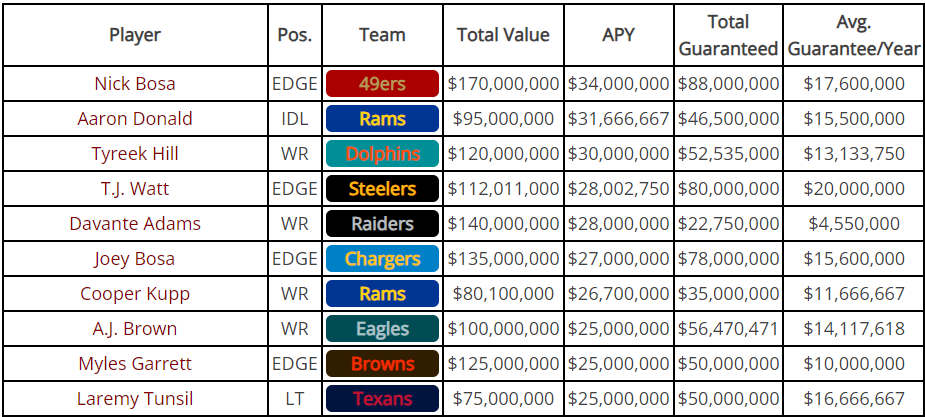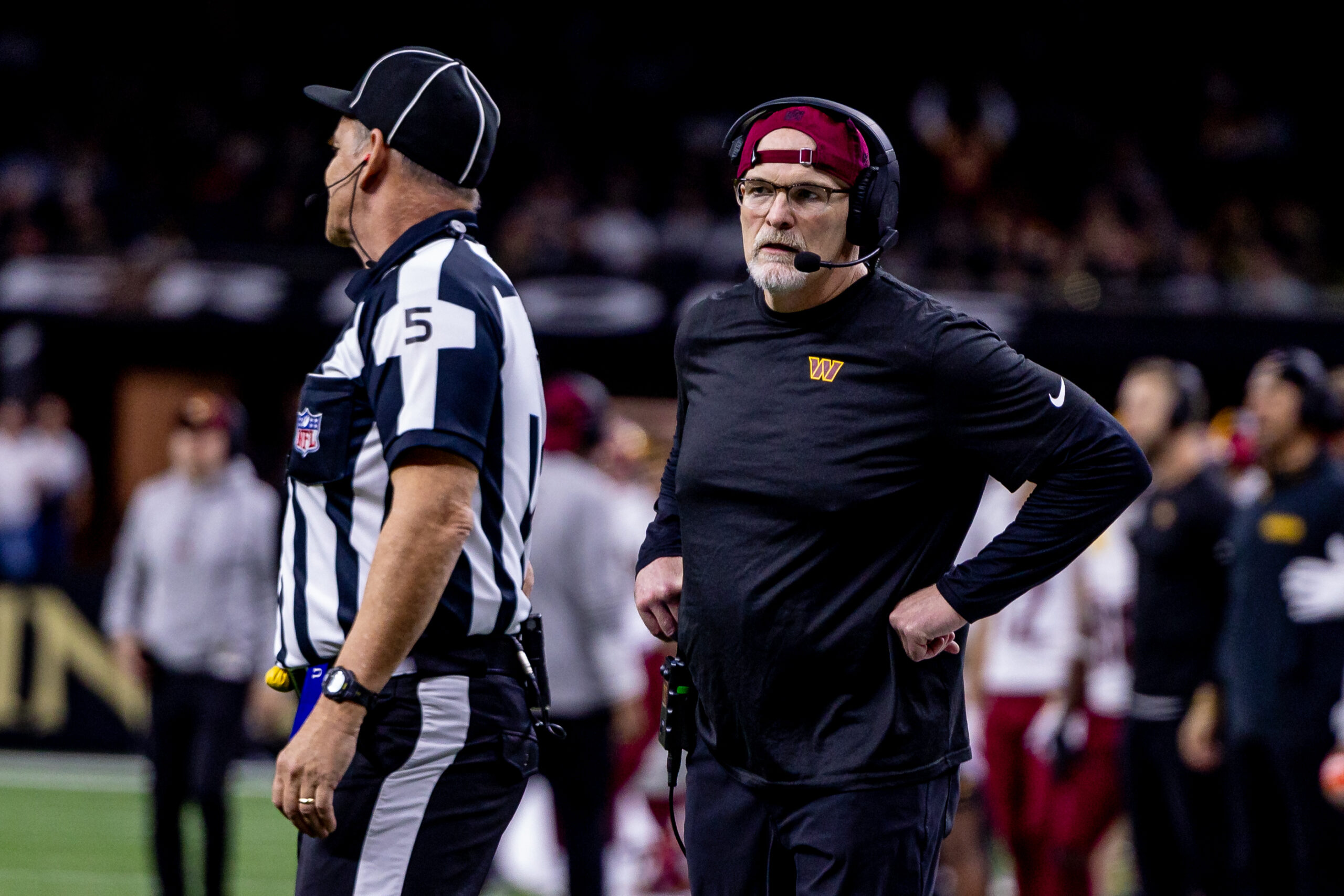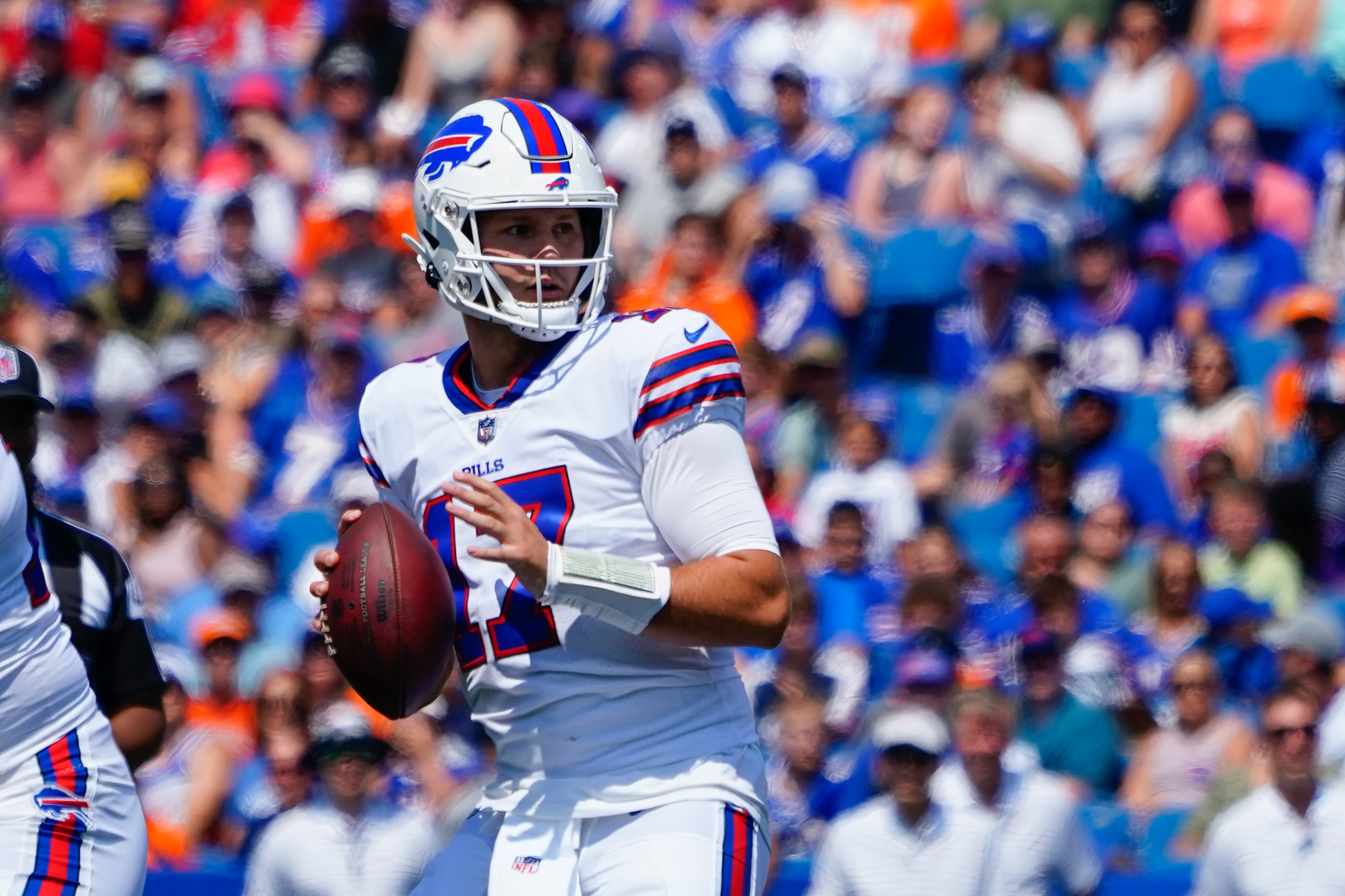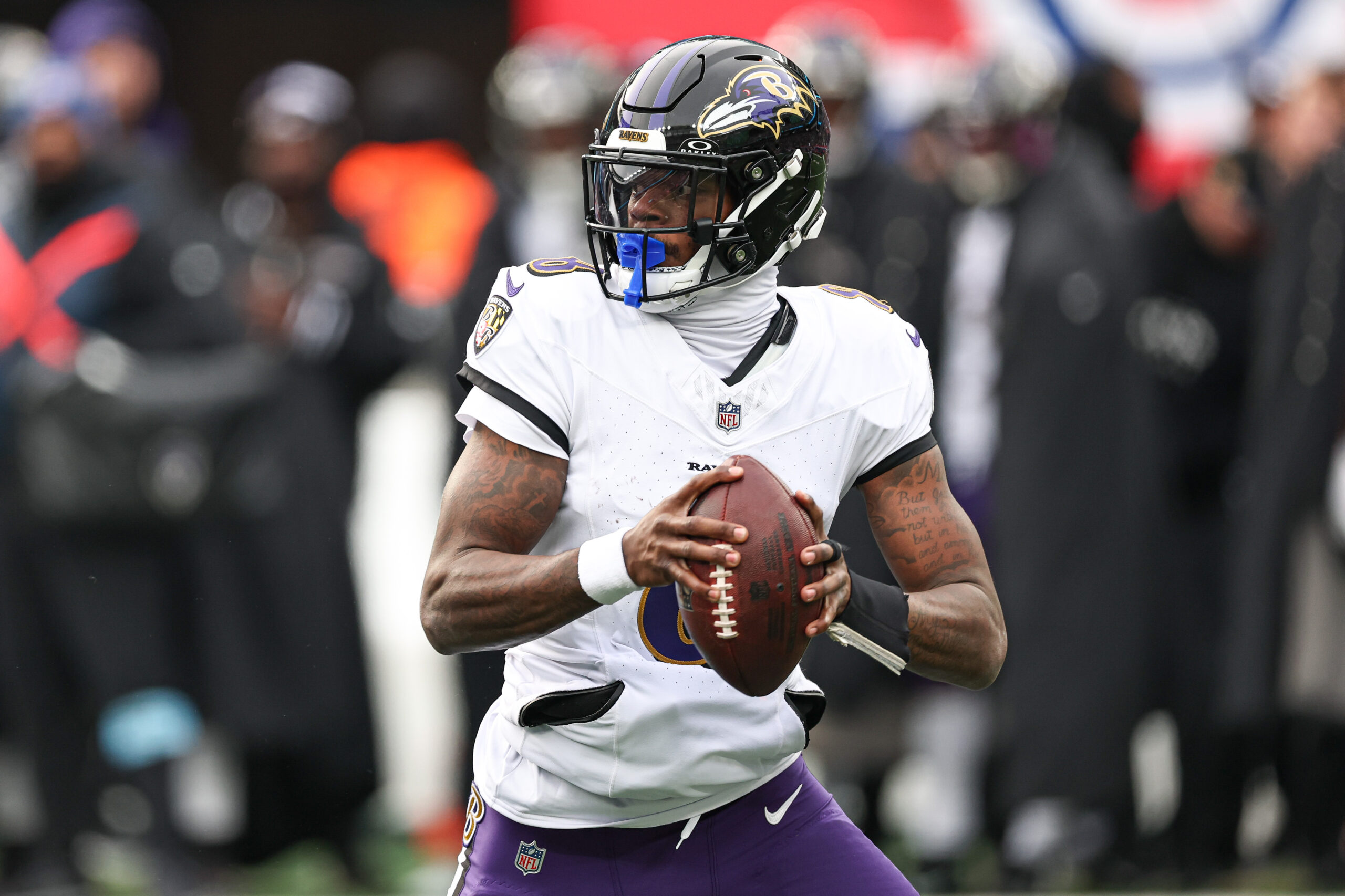Expert Analysis
1/24/24
7 min read
Predicting Justin Jefferson's Record-Setting Contract Extension in 2024

The NFL’s highest-paid wide receiver is Miami Dolphins’ star Tyreek Hill. But not for long. Justin Jefferson should surpass Hill’s $30 million per year extension signed in 2022 sooner rather than later.
There’s a good chance it will happen before free agency opens on March 13, giving the Minnesota Vikings salary cap savings off his 2024 cap hit of $19.743 million.
Jefferson will likely become the NFL’s highest-paid non-quarterback, surpassing Aaron Donald’s average of $31.667 million per year and Nick Bosa’s $34 million per year in new money under his extension signed last September. Bosa’s yearly average is $31.624 million, including the last year of his rookie deal.
Jefferson will try to far exceed Hill’s contract as the highest-paid receiver. Hill’s actual average per year is $28.187 million, including the last year before his extension kicked in.
Jefferson's Climb To The Top
Jefferson just completed his fourth straight 1,000-yard receiving season. He had 68 receptions for 1,074 yards despite missing seven games because of a hamstring injury. Those were the first games missed in his four-year career since joining the Vikings as a first-round pick.
He also had to play with four different quarterbacks in 2023 due to Kirk Cousins’ torn Achilles that ended his season in Week 8.
The 2022 NFL Offensive Player of the Year and three-time Pro Bowler faces constant double teams. Still, he gets open with his speed, strength and great route running. He also regularly makes difficult contested catches with his excellent hands and body control.
JUSTIN JEFFERSON OH MY GOODNESS 😱🤯
— Bleacher Report (@BleacherReport) November 13, 2022
(via @NFL)pic.twitter.com/h71fuciUrv
He holds the NFL record for most receiving yards in a player’s first four seasons (5,899). For context, that total is more than the Chicago Bears’ career receiving leader (Johnny Morris with 5,059 yards), and Jefferson is only 24 years old.
Negotiations have been ongoing for the past year since Jefferson became eligible for an extension after his third season. His 2023 salary was only $2.4 million, but his passion for the game and dedication as a team captain came through as he refused to stage a training camp holdout or even a hold-in this past season.
In the regular-season finale at Detroit, coach Kevin O’Connell suggested to Jefferson in the second half (once the Vikings were eliminated from playoff contention) that he come out of the game to avoid an injury.
Jefferson continued playing and wound up with 12 catches for 192 yards and one touchdown, so he certainly wasn’t protecting himself.
It also helps Jefferson’s negotiating position that he is among the NFL’s most popular players. He is definitely the most admired by Vikings fans who clamor at training camp open practices, “J.J.—do the Griddy.”
His pleasant demeanor has helped him gain many endorsements to raise his net worth. But his long-term contract clearly will be life-altering.
The Vikings could play hardball and threaten a franchise tag in 2025 after forcing Jefferson to play out the final year of his rookie contract.
I highly doubt they’ll take that approach with their best player and a team leader, who has said all the right things during contract negotiations. I believe this deal gets done soon, and here’s how I think it will look.

Predicting Jefferson’s Next Deal
Along with becoming the highest-paid wide receiver, Jefferson is clearly seeking to become the NFL’s highest-paid non-QB. Here's a look at the top 10 contracts for non-QBs, according to OverTheCap.

To top Bosa’s new money and Donald’s per-year average, the Vikings will have to pay Jefferson $170.5 million on a five-year deal. That new money would average $34.1 million annually, surpassing Bosa’s contract.
Including his guaranteed fifth-year option amount of $19.743 million, Jefferson’s total compensation during the next six years would be $190.243 million, which averages $31.707 million per year (higher than Donald's).
I predict the extension will come in at $172.5 million over the five new years from 2025-2029 but Jefferson’s agents will shoot for $175 million — a $35 million average in new money — and settle at $34.5 million per year to top Bosa by $500,000 per year.
They’ll also negotiate for escalators to increase his base salary if he continues to produce among the top receivers. That way, he’s protected and would remain among the highest-paid receivers in the latter years of his new deal as the rising TV money and salary cap fuels increased player salaries.
A $172.5 million five-year extension would increase his six-year average, including the last year of his rookie deal, which will be incorporated into the new contract, to $32.041 million annually.
The signing bonus and guarantees are critical components of any contract. Jefferson will want to match or exceed the top figures for a non-QB in Bosa’s deal — a $50 million signing bonus and $122.5 million guaranteed.
Expect Jefferson’s deal to include a $50 million signing bonus to match Bosa and $125 million guaranteed to exceed him.

Jefferson’s 2024 Salary Cap Helping The Vikings
In caponomics, a five-year extension for $172.5 million would likely include a 2024 base salary at the minimum for a player with four credited seasons of $1,125,000 to help the Vikings achieve a lower cap number.
With a $50 million signing bonus pro-rated for cap purposes over six years (including the last year of his rookie deal), which comes in at $8.333 million per year, his new 2024 cap number will be $8.333 million in signing bonus pro-ration plus the $1.125 million base salary to equal $9.458 million.
That will replace his current cap number of $19.743 million, resulting in $10.285 million in savings. The team is projected to be $30 million under the cap entering the 2024 league year.
The savings with Jefferson’s new contract will help the Vikings’ attempts to re-sign key pending free agents Cousins and Danielle Hunter.
Cousins will seek at least $45 million per year after his productive first eight games in 2023 and a 13-win season in 2022. Hunter will cost the Vikings around $25 million annually as the team’s most important defensive player. He is coming off his best season with 16.5 sacks and a league-leading 23 tackles-for-loss.
The Vikings’ second-best pass rusher — D.J. Wonnum (eight sacks) — is headed to free agency and needs to be re-signed. The Vikings have four other starters free agency-bound: WR K.J. Osborn, OG Dalton Risner, DE Jonathan Bullard and LB Jordan Hicks, along with K Greg Joseph.
The NFC North should be one of the league’s best divisions next season. Minnesota is trying to keep pace with two final-eight playoff teams in the Detroit Lions and Green Bay Packers. Also, the Bears won four of their last six games and hold the No. 1 and No. 9 picks in the upcoming draft.
The Vikings need to keep their top players and bring in more talent via free agency and the draft, especially at cornerback. Jefferson’s new deal can help free up more cap space for that endeavor.
Comparing Jefferson to The Greats
Jefferson has 392 receptions for 5,899 yards and 30 TDs, and his outstanding career could have another 10 years or more to go. By the time he retires, he’ll have a good shot at passing Hall of Famer Cris Carter as the Vikings’ all-time receiving leader (1,004 catches, 12,383 yards, 110 TDs).
He also could take a run at NFL career leader Jerry Rice’s seemingly insurmountable 1,549 receptions and 22,895 yards (with 197 receiving TDs).
With his next signing bonus alone, Jefferson should exceed the $33 million Carter earned in his 15-year career through 2002 and the $42.4 million in salary paid to Rice in a 20-year career that ended in 2004.
With this upcoming extension, he’ll dwarf the $82.5 million earned over a 14-year career by another legendary Vikings Hall of Fame receiver, Randy Moss, who retired in 2012.
Such is the benefit of being an All-Pro and the best receiver in a league where revenues and player salaries have sky-rocketed since the days of Carter, Rice and Moss.









